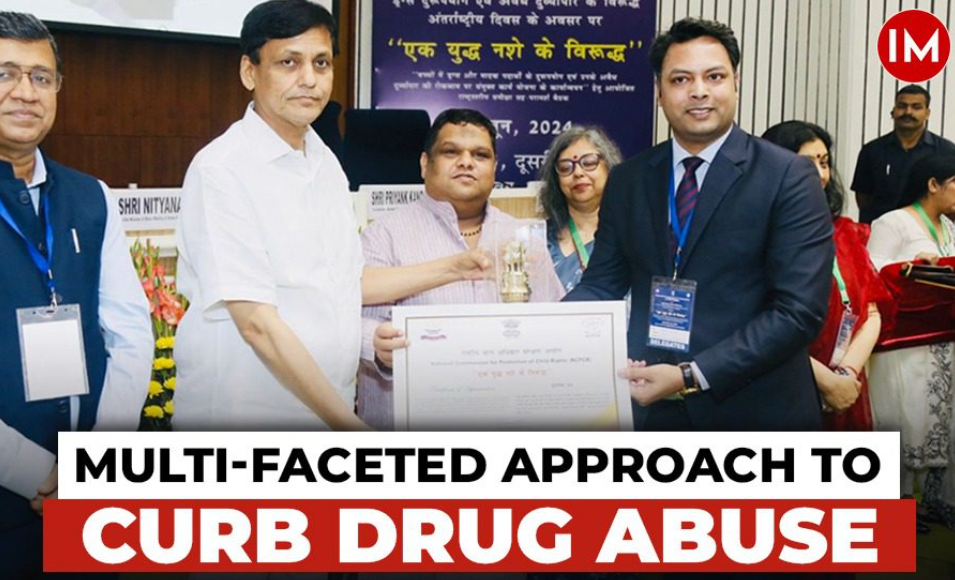Abhinav Singh leads North Garo Hills in eradicating drug abuse with a multifaceted approach, earning recognition for the district.

With a staggering increase in drug abuse among young people in India, where statistics show a significant rise in the number of adolescents falling prey to substance abuse, the battle against drugs has never been more urgent.
In the serene landscapes of Meghalaya’s North Garo Hills, a remarkable transformation is underway, led by Abhinav Singh, a 2020-batch IAS officer and the Deputy Commissioner of the district. His relentless dedication has recently earned the district the prestigious title of one of India’s “Best Performing Districts” in the implementation of the Joint Action Plan on Drug Abuse and Illicit Trafficking. This accolade is not just a demonstration of Mr. Singh’s leadership but also of the collective resolve of the community and officials working hand-in-hand to create a safer, drug-free environment.
The journey began with a multifaceted approach, engaging schools, the excise department, local pharmacies, and the community at large. Mr. Singh’s initiative was driven by a simple yet powerful goal, “To curb the scourge of drug abuse and prevent illicit trafficking, making North Garo Hills a model district for others to emulate,” Mr. Singh shared.
AWARENESS AND EDUCATION
The campaign kicked off with an extensive awareness program, spearheaded by the District Social Welfare Officer. In 20 schools, informative sessions and training were conducted, accompanied by a short video clip highlighting the perils of drug abuse. These sessions aimed not just to inform but also to inspire young minds to resist the allure of drugs.
Further amplifying the message, Prahari Clubs were established in 108 schools. “These clubs became vibrant centers of activity, with students performing short skits, reading pledges during morning assemblies, and engaging in drawing competitions and rallies.” These activities, designed to be both educational and entertaining, have successfully instilled a sense of responsibility and vigilance among students.
STRENGTHENING SURVEILLANCE: A HARD-HITTING APPROACH
In a significant move to clamp down on illegal liquor sales, the Excise Department was instructed to ensure that all 39 wine shops in the district installed CCTV cameras. This step was crucial in preventing the sale of alcohol to minors. “All wine shops will have to install CCTV cameras inside and outside their premises, ensure they are functional, and provide footage whenever asked by the Excise Department, failing which their license will be cancelled,” Mr. Singh informed. This measure has already begun to show results, with the Excise Department now able to monitor and deter the sale of liquor to minors effectively.
TOBACCO AND DRUG REGULATION
Following the guidelines for cigarettes and other tobacco products (Prohibition of Advertisement and Regulation of Trade and Commerce, Production, Supply, and Distribution) Act, 2003, all tobacco-selling shops within 100 meters of schools were ordered to relocate. This move, aimed at reducing the exposure of children to tobacco products, has reinforced the district’s commitment to creating a healthier environment for its youth.
Additionally, pharmacies in the district were instructed to install CCTV cameras and adhere strictly to regulations concerning the sale of Schedule “X” and “H” drugs.
The officer informed Indian Masterminds that drugs in Schedule “H” are prescription drugs and can be sold only on the prescription of a registered medical practitioner. These drugs include antibiotics, painkillers, and certain other drugs that have the potential for abuse.
Further, Schedule “X” drugs are prescription drugs that have a very high potential for abuse and addiction. The drugs include strong painkillers, sedatives, and stimulants, and can be sold only on a special prescription form that is issued by a registered medical practitioner with a license to prescribe Schedule “X” drugs.
“The installation of cameras has effectively curtailed the practice of selling these drugs without proper prescriptions, ensuring that only those in genuine need have access to them,” the officer added.
COMMUNITY AND INSTITUTIONAL INVOLVEMENT
Mr. Singh’s vision extended beyond immediate regulatory measures. He mobilized all stakeholders under the Joint Action Plan to spread awareness across schools and institutions. These efforts included instructing institutions to install CCTV cameras to monitor and prevent substance abuse among students. This community-centric approach has fostered a supportive environment where everyone is vigilant and proactive against drug abuse.
RESULTS THAT SPEAK VOLUMES
The results of these combined efforts are evident. The district’s proactive measures have significantly reduced the incidence of drug abuse and illegal trafficking, setting a benchmark for other regions. The installation of CCTV cameras in wine shops and pharmacies has not only curtailed illegal sales but also enhanced the overall safety and security of the district.
Abhinav Singh’s leadership in North Garo Hills exemplifies how determined governance, community involvement, and innovative strategies can collectively combat one of society’s most pressing challenges. As the district celebrates this achievement, it stands as a blueprint for other regions striving to eliminate drug abuse and illicit trafficking.
Article Credit: indianmasterminds